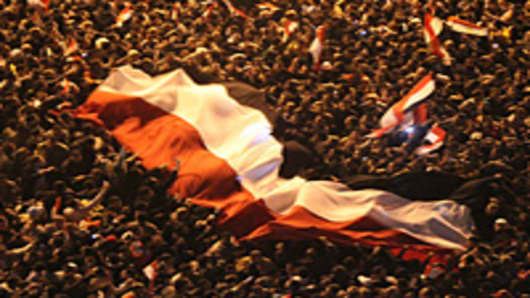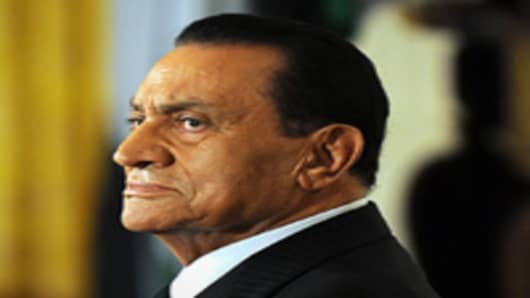A furious wave of protest finally swept Egypt's President Hosni Mubarak from power on Friday after 30 years of one-man rule, sparking jubilation on the streets and sending a warning to autocrats across the Arab world and beyond.
Mubarak, the second Arab leader to be overthrown by a popular uprising in a month, handed power to the army after 18 days of relentless rallies against poverty, corruption and repression caused support from the armed forces to evaporate.
Vice President Omar Suleiman said a military council would run the affairs of the most populous Arab nation. A free and fair presidential election has been promised for September, though some question the army's appetite for real democracy.
Mubarak, 82, had flown with his family from Cairo to the Red Sea resort of Sharm el-Sheikh, a ruling party official said.
Stocks rose in reaction to Mubarak's resignation, while oil prices fell .
Prices of gold and U.S. Treasury bonds partly erased early gains. The U.S. dollar briefly pared gains, but remained strong against a basket of major currencies.
"It looks like the stock market is taking the news well," said Gary Thayer, chief macro strategist with Wells Fargo in St. Louis. "One thing that has weighed on investor sentiment is that the price of oil would go up in the case of political turmoil, and Mubarak's leaving reduces that possibility."
Ecstatic Egyptians celebrated in carnival mood on the streets and people embraced in Cairo's Tahrir, or Liberation, Square, the main focus for protest. Many simply sobbed for joy.
"Nightmare over!" said tailor Saad el Din Ahmed, 65, in Cairo.
"Now we have our freedom and can breathe and demand our rights. In Mubarak's era, we never saw a good day. Hopefully now we will see better times," said Mostafa Kamal, 33, a salesman.
President Obama, speaking from the White House, told reporters that the world had witnessed a true moment of history.
"Egyptians have inspired us," Obama said.
There was a note of caution in the background, however, over how far the military under Field Marshal Mohamed Hussein Tantawi, Mubarak's veteran defence minister, are ready to permit a democracy—especially since the hitherto banned Islamist Muslim Brotherhood is one of the best organized forces.
"This is just the end of the beginning," said Jon Alterman of the Center for Strategic and International Studies. "Egypt isn't moving toward democracy, it's moved into martial law and where it goes is now subject to debate."
U.S. officials familiar with the U.S.-sponsored Egyptian military say Tantawi, 75, has long seemed resistant to change. In a statement, the higher military council said it would take measures for an interim phase and hoped to realise people's hopes.
Striking the even-handed note the military has maintained throughout the crisis, it praised Mubarak for resigning "in the interests of the nation" and the "martyrs" who died protesting.
Risk consultancy Stratfor said: "The military has carried out a coup led by...Tantawi. It is not clear whether Suleiman will remain as civilian head of the army-led government. Egypt is returning to the 1952 model of ruling the state via a council of army officers."
The crisis that brought down Mubarak was the worst since British-backed King Farouk was toppled in a military coup staged by a group of officers in 1952. Generals have ruled ever since.
A senior member of the Muslim Brotherhood said Egyptians had achieved the main goal of their popular uprising.
"I salute the Egyptian people and the martyrs. This is the day of victory for the Egyptian people. The main goal of the revolution has been achieved," Mohamed el-Katatni, former leader of the Brotherhood's parliamentary bloc, told Reuters.
But injecting a note of caution about the military's role in Egypt's future, Katatni said the Brotherhood awaits the next steps to be taken by the Higher Military Council which has taken charge of the country's affairs after Mubarak's decision.
"This is the greatest day of my life," said opposition activist and Nobel Peace laureate Mohamed ElBaradei, welcoming a period of sharing of power between the army and the people.
He told Reuters that running for president was not on his mind.
"This nation has been born again, these people have been born again, and this is a new Egypt," said Ayman Nour, the only politician who dared to challenge Mubarak in Egypt's only multi-candidate presidential election. He came a distant second.
They waved flags, set off fireworks and beat drums to celebrate this new chapter in modern Egyptian history.
SMS text messages of congratulation zapped over mobile phone networks among ordinary Egyptians, hailing a victory for people power.
A speaker made the announcement in Tahrir Square where hundreds of thousands danced and sang, chanting: "The people have brought down the regime." Others shouted: "Allahu Akbar (God is greatest)." Women ululated in jubilation.
"I think you could see some contagion in terms of protests; Morocco, perhaps Jordan, Yemen," said Anthony Skinner of political risk consultancy Maplecroft.
Israel, with whom Egypt signed the first Arab peace treaty in 1979, said it hoped relations would remain peaceful.
The confrontation had raised fear of uncontrolled violence in Egypt, a linchpin U.S. ally in an oil-rich region where the chance of chaotic unrest spreading to other long stable but repressive states troubles the West.
Swiss authorities said they had frozen assets that may belong to Mubarak.
Washington has called for a prompt democratic transition to restore stability in Egypt, a rare Arab state no longer hostile to Israel, guardian of the Suez Canal linking Europe and Asia and a major force against militant Islam in the region.




